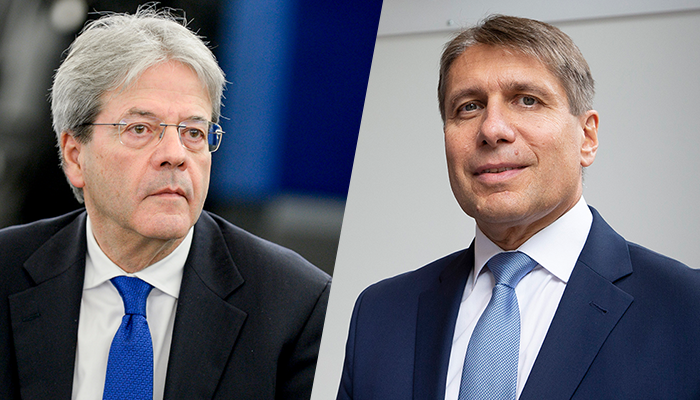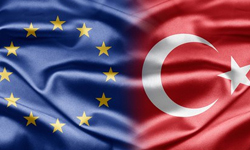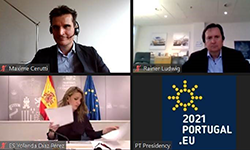BusinessEurope Headlines No. 2021-08
Discussing CBAM: We must ensure our companies' competitiveness

On 8 March, BusinessEurope Director General Markus J. Beyrer participated in a roundtable to discuss the preparations for a Carbon Border Adjustment Mechanism (CBAM) with Commissioner Paolo Gentiloni, Director General Gerassimos Thomas (DG TAXUD) and representatives of business federations and NGOs. Beyrer underlined that given its unilateral nature, a CBAM risks to unlevel the playing field with international competitors. It is therefore of utmost importance to maintain existing mechanisms like the free allowances under the ETS to maintain European companies' competitiveness, specifically on third markets. "Removing free allowances before having put to test the CBAM and proven its effectiveness would be dangerous and irresponsible." Beyrer further underlined the importance of WTO compatibility and early reach-out for a transparent dialogue with trading partners, especially in our immediate neighbourhood, to minimise the risk of harmful retaliatory measures. Read more about our position on a CBAM in our position paper "What trade can do for climate" and our reply to the Commission public consultation.
Contact: Jasmin Ploner
Our comment:
Supply chains – resilience must not equal protectionism
By Luisa Santos, Deputy Director General

The COVID-19 pandemic has created an unprecedented health crisis with a strong and probably long-lasting impact on global supply chains. First, there is pressure on supply and demand of goods and services directly used in the fight against the virus. In face of a health crisis of this magnitude the supply side was far from meeting demand needs. Industry is doing its best to respond but there are numerous challenges that come from the fact that we are developing new products and scaling up production in an extremely short period of time. Second, there are problems related to the lockdown measures and travel restrictions that are impacting transport and logistics as well as movement of people. These are also making prices go up in some of the most used transport and shipping routes in the world. In certain cases, the price of containers in routes between Europe and Asia is four times more expensive today than it was by the end of 2020.
In face of these challenges many are questioning the benefits of global value chains, calling for production to come back to Europe, reducing dependency on imports. There are also calls for supply chains to become more resilient. But what exactly does it mean making supply chains more resilient?
Resilience must not equal protectionism. Making supply chains less vulnerable to external shocks is a welcome objective. Promoting diversification and reducing exposure to less reliable suppliers has also merits. However, these objectives must be achieved on economic merits and above all when and how to achieve them should be a company decision. Companies know best their business and the markets they operate on. Governments should focus on creating a regulatory environment that is conducive to investments and supportive of European competitiveness.
So, what can Europe do to improve supply chains' resilience without resorting to protectionism? First, promoting market diversification. If we have better conditions to access more sources of supply at competitive prices, we mitigate our risk and exposure to one or two suppliers. We can achieve this objective by concluding and implementing bilateral trade agreements. Second, we should ensure that we have a regulatory environment that is adapted to deal with unforeseen external shocks. Institutionalising coordination platforms between the European Commission and Member States that can act rapidly and effectively in crisis mode is fundamental. Keeping trade flowing within the EU and between the EU and third countries has proven essential to deal with a global crisis as the current one and should be a learning lesson for the future. Third, it is important to create the necessary conditions for companies to invest and produce in Europe in a competitive way. This means for instance ensuring that European companies' competitiveness is not undermined by foreign subsidies that are providing an artificial advantage to competitors in key areas like public procurement or mergers and acquisitions.
We must not take hasty decisions spurred by an emergency crisis. A crisis exposes shortcomings, but it is not the right basis for long-term measures that are supposed to apply to normal times. Since 85% of economic growth by 2024 will be generated outside the EU, it is in our interest to keep markets open and allow more companies, especially SMEs, to benefit from these growth opportunities.
Time to make the Taxonomy up to EU’s investment needs
 "To reach the recently proposed 2030 55% greenhouse gas emissions reduction target, the EU will need to mobilise around €350 billion of annual investments", stated Alexandre Affre, Deputy Director General of BusinessEurope, at the EU-Japan webinar on Sustainable Finance on 9 March. "With such a high investment need, the EU Taxonomy has the potential for companies to attract the necessary investments to transition, and for investors to clarify what is environmentally sustainable", continued Affre to explain the benefits that a well-designed Taxonomy Regulation should bring. While its architecture has already been set up last year, the EU is now preparing the secondary legislation to make the Taxonomy work. "We are at a decisive moment, and I see many challenges ahead. Firstly, the interaction with existing legislations; secondly, the calibration of the technical screening criteria for economic activities to be labelled as sustainable, while allowing for transition; thirdly, the need to clarify the large amount of uncertainties around corporate disclosure", concluded Affre.
"To reach the recently proposed 2030 55% greenhouse gas emissions reduction target, the EU will need to mobilise around €350 billion of annual investments", stated Alexandre Affre, Deputy Director General of BusinessEurope, at the EU-Japan webinar on Sustainable Finance on 9 March. "With such a high investment need, the EU Taxonomy has the potential for companies to attract the necessary investments to transition, and for investors to clarify what is environmentally sustainable", continued Affre to explain the benefits that a well-designed Taxonomy Regulation should bring. While its architecture has already been set up last year, the EU is now preparing the secondary legislation to make the Taxonomy work. "We are at a decisive moment, and I see many challenges ahead. Firstly, the interaction with existing legislations; secondly, the calibration of the technical screening criteria for economic activities to be labelled as sustainable, while allowing for transition; thirdly, the need to clarify the large amount of uncertainties around corporate disclosure", concluded Affre.
Contact: Carolina Vigo
Economic and regulatory alignment key to move EU-Turkey trade relations forward
 On 10 March, Deputy Director General of BusinessEurope Luisa Santos joined a high-level panel on EU-Turkey trade and economic relations and common challenges in view of the EU Green Deal, which took place in the framework of the EU-Turkey Business Dialogue – a project funded by the EU. Santos said: "There is an opportunity to make the EU-Turkey trade and economic relationship larger and more beneficial for both parties. Updating the Customs Union Agreement can play an important role in this regard, by including areas such as trade in services and public procurement, an effective and functioning dispute settlement mechanism and, in general, by meeting the criteria of modern business." Businesses recognise that this process is connected to progress on the political front and express their hope that the EU Council in March will contribute to solutions and that both sides will demonstrate a strong commitment. Santos continued: "Economic alignment is very important, but it has to go hand in hand with regulatory alignment between the EU and Turkey. This is especially the case for the Green Deal, where the EU is taking ambitious legislative measures that will have an impact on Turkey. It is important to address them in different fora and by a variety of means, including a strong Trade and Sustainable Development Chapter in a modernised Customs Union Agreement and dialogue."
On 10 March, Deputy Director General of BusinessEurope Luisa Santos joined a high-level panel on EU-Turkey trade and economic relations and common challenges in view of the EU Green Deal, which took place in the framework of the EU-Turkey Business Dialogue – a project funded by the EU. Santos said: "There is an opportunity to make the EU-Turkey trade and economic relationship larger and more beneficial for both parties. Updating the Customs Union Agreement can play an important role in this regard, by including areas such as trade in services and public procurement, an effective and functioning dispute settlement mechanism and, in general, by meeting the criteria of modern business." Businesses recognise that this process is connected to progress on the political front and express their hope that the EU Council in March will contribute to solutions and that both sides will demonstrate a strong commitment. Santos continued: "Economic alignment is very important, but it has to go hand in hand with regulatory alignment between the EU and Turkey. This is especially the case for the Green Deal, where the EU is taking ambitious legislative measures that will have an impact on Turkey. It is important to address them in different fora and by a variety of means, including a strong Trade and Sustainable Development Chapter in a modernised Customs Union Agreement and dialogue."
Contact: Sofia Bournou
Airbus-Boeing tariff suspension important step towards a solution

On 5 March, the European Commission and the United States Trade Representative agreed to suspend for 4 months the tariffs currently applied to aircraft and non-aircraft products in relation to the WTO aircraft disputes. BusinessEurope Director General Markus J. Beyrer commented: "This is an important first step to find a negotiated solution to a long-standing dispute that has been casting a shadow on the transatlantic relationship. It is welcome news for many European companies, big and small that have been struggling with the additional duties on top of an unprecedented health and economic crisis. We are confident that both sides will be open and strongly committed to finding a permanent solution that could also mark a new and more positive era in EU-US relations."
Contact: Luisa Santos
Social partners need better EU support to implement their agreements
 The European social dialogue has an important role to contribute to EU policy-making on employment and social policy, and make labour markets more efficient and adapted to new and changing economic and social realities. With the increasing use of telework during the Covid-19 crisis, we are willing to look into this issue with trade unions, keeping in mind that there are already two related autonomous social partner agreements. The first is the 2002 EU cross-industry telework autonomous social partner agreement about voluntary telework. The second – the 2020 autonomous social partner agreement on digitalisation – is currently being implemented across Europe, and we are looking forward to working constructively with the European Trade Union Confederation (ETUC) to achieve its good implementation. Now, to make the best of these agreements, it is important that the European Commission improves its financial support to social partners, in particular in European countries where social dialogue is comparatively less developed. The Commission's announcement in its recent action plan to implement the European pillar of social rights, about preparing a new supporting frame for social partner agreements at EU level should support the role of autonomous social partner agreements as part of EU social policy-making. We are eager to continue this discussion with the Commission and ETUC in the run up to the announced Commission’s initiative on social dialogue in 2022. These were the key messages of Maxime Cerutti, Social Affairs Director, during the high-level Portuguese Presidency conference on "Remote work: Challenges, risks and opportunities" that was held on 9 March 2021.
The European social dialogue has an important role to contribute to EU policy-making on employment and social policy, and make labour markets more efficient and adapted to new and changing economic and social realities. With the increasing use of telework during the Covid-19 crisis, we are willing to look into this issue with trade unions, keeping in mind that there are already two related autonomous social partner agreements. The first is the 2002 EU cross-industry telework autonomous social partner agreement about voluntary telework. The second – the 2020 autonomous social partner agreement on digitalisation – is currently being implemented across Europe, and we are looking forward to working constructively with the European Trade Union Confederation (ETUC) to achieve its good implementation. Now, to make the best of these agreements, it is important that the European Commission improves its financial support to social partners, in particular in European countries where social dialogue is comparatively less developed. The Commission's announcement in its recent action plan to implement the European pillar of social rights, about preparing a new supporting frame for social partner agreements at EU level should support the role of autonomous social partner agreements as part of EU social policy-making. We are eager to continue this discussion with the Commission and ETUC in the run up to the announced Commission’s initiative on social dialogue in 2022. These were the key messages of Maxime Cerutti, Social Affairs Director, during the high-level Portuguese Presidency conference on "Remote work: Challenges, risks and opportunities" that was held on 9 March 2021.
Contact: Maxime Cerutti
Thinking out of the box to support young jobseekers in the recovery period
 To support the recovery, public employment services (PES) shall reach out to young people to facilitate their entry or re-integration in the labour market. Apprenticeships are a very effective way of facilitating transition between education and the world of work. During the Covid-19 pandemic, company-based learning has become challenging due to lockdowns and lingering recession, which prevents some companies from committing to a 3-4- year-long programmes. To keep young people in contact with companies, public employment services should support apprenticeship programs, whenever possible. This support may include mapping local labour market needs as well as emerging businesses and jobs, orienting young people to available job offers and encouraging enterprises to adjust and maintain their apprenticeship offer. Close cooperation with employers is necessary to inform young people about the perspectives of a chosen profession at the local labour markets. It is also important to cooperate with different organisations, for example NGOs, civil society organisations, healthcare services etc. to make sure that proposed measures are adopted to individual situations and facilitate effective integration. These were the main messages of Anna Kwiatkiewcz-Mory during the PES Network seminar "Supporting young jobseekers in the recovery period" on 4 March.
To support the recovery, public employment services (PES) shall reach out to young people to facilitate their entry or re-integration in the labour market. Apprenticeships are a very effective way of facilitating transition between education and the world of work. During the Covid-19 pandemic, company-based learning has become challenging due to lockdowns and lingering recession, which prevents some companies from committing to a 3-4- year-long programmes. To keep young people in contact with companies, public employment services should support apprenticeship programs, whenever possible. This support may include mapping local labour market needs as well as emerging businesses and jobs, orienting young people to available job offers and encouraging enterprises to adjust and maintain their apprenticeship offer. Close cooperation with employers is necessary to inform young people about the perspectives of a chosen profession at the local labour markets. It is also important to cooperate with different organisations, for example NGOs, civil society organisations, healthcare services etc. to make sure that proposed measures are adopted to individual situations and facilitate effective integration. These were the main messages of Anna Kwiatkiewcz-Mory during the PES Network seminar "Supporting young jobseekers in the recovery period" on 4 March.
Contact: Anna Kwiatkiewicz-Mory
Calendar 
- 15 March: meeting of the Eurogroup
- 16 March: Climate Dialogues webinar - Energy scenarios towards a climate-neutral EU
- 19 March: Financing the recovery: the role of financial markets in rebuilding the European economy
- 24 March: Tripartite Social Summit
Not yet a subscriber? Register here.
Reminder: please have a look at our privacy policy